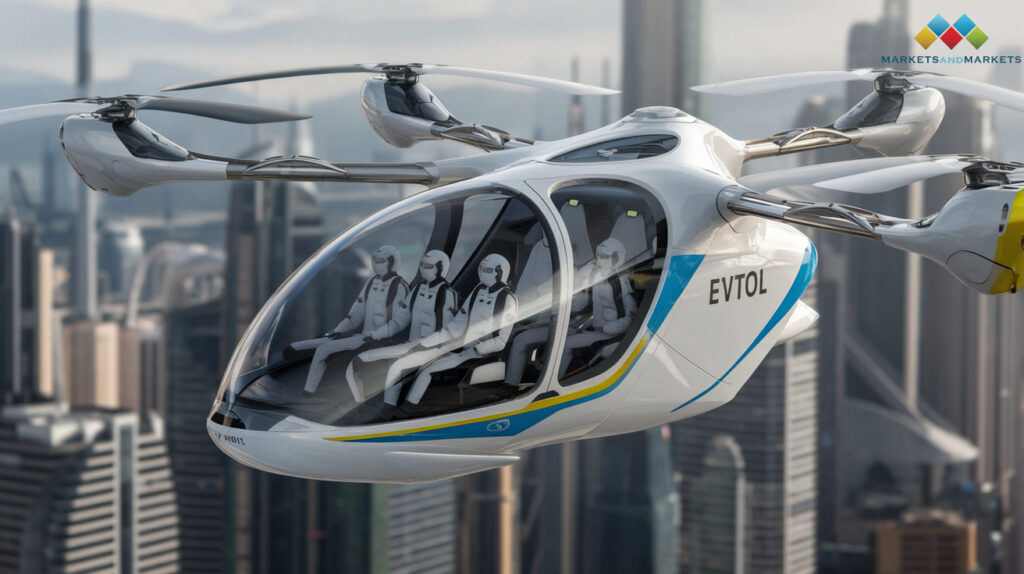The eVTOL aircraft market is set for significant growth, expanding from USD 1.2 billion in 2023 to USD 23.4 billion by 2030. This surge is fueled by advancements in electric propulsion, the rising demand for urban air mobility, and environmental pressures for cleaner aviation solutions. With a projected CAGR of 52.0%, the eVTOL industry is one of the most dynamic and rapidly evolving sectors.
Download PDF Brochure @ https://www.marketsandmarkets.com/pdfdownloadNew.asp?id=28054110

As global urbanization continues, traditional transportation methods are increasingly inefficient. The growing focus on reducing carbon emissions and traffic congestion has propelled the need for innovative solutions like eVTOLs, which offer fast, point-to-point travel, bypassing road congestion and minimizing environmental impact.
Key Technologies:
- Lift + Cruise Technology: This rapidly growing segment separates vertical lift from forward propulsion, enhancing flight efficiency. It allows for seamless transitions between take-off and horizontal flight, making it the leading technology in the eVTOL market by 2023.
- Vectored Thrust: Enabling precise control and agility, vectored thrust technology allows eVTOLs to hover and maneuver more efficiently. This is particularly useful in congested urban airspaces, where flexibility is essential for urban air mobility.
Propulsion Types:
- Fully Electric Propulsion: Fully electric eVTOLs are expected to dominate the market through 2030 due to their eco-friendly nature. Improvements in battery technology and energy efficiency continue to drive growth in this segment.
- Hybrid & Electric Hydrogen Propulsion: These propulsion methods, while less common, provide extended range capabilities, making them ideal for longer-distance applications.
Autonomy in Operation: Autonomous eVTOLs are becoming the focus of the market, eliminating the need for pilots and offering enhanced safety and efficiency through advanced technologies like GPS-denied navigation and autonomous “detect and avoid” systems. This shift is crucial for urban air mobility, cargo transport, and emergency services.
Automation is not unique to aviation but is a growing trend across industries. In eVTOLs, autonomy provides greater safety and operational efficiency, especially in complex urban environments where minimizing human error is critical.
eVTOL Aircraft Industry Opportunities: The eVTOL industry presents numerous opportunities across urban air mobility, cargo transportation, and emergency services. As cities face stricter environmental regulations and growing congestion, eVTOLs provide a fast, eco-friendly, and efficient alternative for short-distance travel. Technological advancements in electric propulsion, battery efficiency, and autonomous flight systems offer companies the chance to tap into the expanding market for sustainable transportation. The healthcare and logistics sectors, in particular, could benefit from rapid medical transport and faster delivery options. With increasing government and private investment in infrastructure, the eVTOL market is ripe for innovation and growth.
Regional Insights:
- Europe: Expected to lead in growth, Europe’s focus on electric and hybrid propulsion technologies, combined with rising commercial air travel and military adoption of UAVs, positions it as a key player in the eVTOL industry.
Market Drivers:
- The need for urban air mobility to combat congestion and reduce emissions.
- Technological advancements in electric propulsion and battery storage.
- Increased government and private sector investment in eVTOL development, particularly in North America and Europe.
Key Market Leaders: Prominent companies like Airbus SE, Ehang Holdings Ltd., Joby Aviation, Inc., Volocopter GmbH, and Lilium GmbH are leading the charge in eVTOL innovation, focusing on cutting-edge advancements in propulsion, automation, and urban air mobility systems.
Market Challenges:
- Regulatory obstacles regarding airspace management, particularly in dense urban areas.
- Safety and certification issues, especially for autonomous aircraft.
- Battery life and energy density limitations, which affect range and payload capabilities.
Ask for Sample Report @ https://www.marketsandmarkets.com/requestsampleNew.asp?id=28054110
Future of the eVTOL Aircraft Market: The future of the eVTOL market is bright, with rapid growth expected through 2030. Ongoing improvements in battery technology will extend the range of these aircraft while reducing costs, making them more accessible. Urban air mobility is set to become a staple in large cities, supported by autonomous flight technology and real-time air traffic management systems. As eVTOLs align with global efforts to reduce carbon emissions, they will become a crucial part of sustainable transportation. In the long term, eVTOLs have the potential to transform sectors such as logistics, defense, and healthcare, revolutionizing how people and goods move within and between cities.